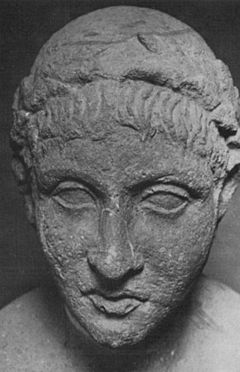Publius Cornelius Scipio Nasica Corculum | |
|---|---|
 The so-called "Head of Ennius", found in the Tomb of the Scipiones, identified by Filippo Coarelli as that of Scipio Nasica Corculum, now in the Museo Pio Clementino, Vatican.[1][2] | |
| Born | c. 206 BC |
| Died | c. 141 BC |
| Nationality | Roman Republic |
| Office | Consul (162, 155 BC) Censor (159 BC) Pontifex maximus Princeps senatus |
| Children | Publius Cornelius Scipio Nasica Serapio |
| Military career | |
| Rank | Military tribune, consul |
| Wars | Third Macedonian War • Battle of Pydna First Dalmatian War |
| Awards | Roman triumph |
Publius Cornelius Scipio Nasica Corculum[i] (c. 206 BC – c. 141 BC) was a politician of the Roman Republic. Born into the illustrious family of the Cornelii Scipiones, he was one of the most important Roman statesmen of the second century BC,[3] being consul two times in 162 and 155 BC, censor in 159 BC, pontifex maximus (chief priest) in 150 BC, and finally princeps senatus (leader of the Senate) in 147 BC.
Corculum was a talented military commander, who played a decisive role during the Battle of Pydna in 168 BC; he later won a triumph over the Dalmatae in 155 BC. He was remembered as a staunch conservative, defender of the ancestral Roman customs against political and cultural innovations, notably Hellenism, in contradiction with the policies of his famous father-in-law Scipio Africanus and cousin Scipio Aemilianus. This conservatism led him to order the destruction of the first stone theatre in Rome in 151 BC and to oppose the final war against Carthage, advocated by his rival Cato the Censor. In spite of his political influence, Corculum could not prevent the war from being voted in 149 BC, with the probable support of his cousin Scipio Aemilianus, who destroyed Carthage in 146 BC.
Due to a lack of sources, his life is sparsely known. Moreover, ancient authors often give contradictory accounts of his life; as a result, modern historians have had diverging interpretations to explain some of his deeds, especially his opposition to the war against Carthage, or his destruction of the first Roman theatre in stone.
Cite error: There are <ref group=lower-roman> tags or {{efn-lr}} templates on this page, but the references will not show without a {{reflist|group=lower-roman}} template or {{notelist-lr}} template (see the help page).